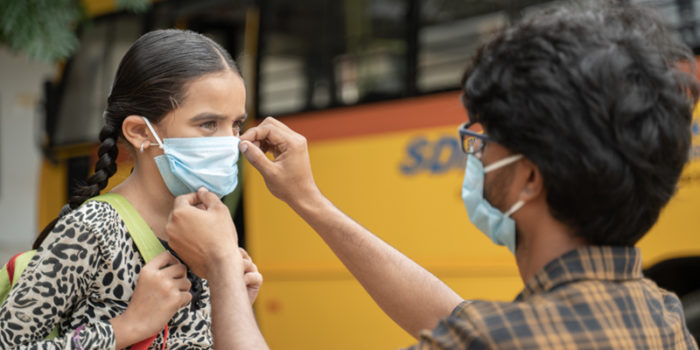
With so much concern around the pandemic in India, we thought it might be helpful to provide some quick responses to Frequently Asked Questions that we have been receiving. Special thanks to destination services providers IKAN Relocations, IOS Relocations and Writer Relocations for their candid and quick responses to our requests over the past few weeks.
According to Rohit Kumar of IKAN Relocations, while the situation is very grim right now and will likely get worse before it gets better (through May and possibly into June), 60-70% of the population will reach heard immunity as vaccination programs speed up. Although a third wave is expected around October, with increased government awareness and international support and aid, we expect some sort of control in 3-4 months with more production of oxygen and vaccines being more widely available.
Which age groups are currently eligible to be vaccinated in India? Is it the same throughout the country or dictated state by state?
Lata Patel of IOS Relocations responds: “Currently anyone over 18 years of age is eligible to get vaccinated in India. However, at present most states have put a hold on vaccinating the population between the age group 18-44 years old, due to a shortage of vaccines.”
To that point, are there enough vaccinations available?
While most locations are facing a vaccine shortage, the government has increased production and is working on importing vaccines to meet the country’s requirements. As the number of cases rise, there is a huge shortage of ICU/ventilator/oxygen beds across India and certainly in large cities like Delhi. Hence more and more beds are being created in make-shift facilities and hospitals.
Lata tells us, “Most state governments are rolling out global RFPs for COVID-19 vaccines to avoid dependency on Indian-made vaccines. The Serum Institute of India & Bharat Biotech, the manufacturers of the Covishield and Covaxin vaccines, have ramped up production of their vaccines. The Russian vaccine Sputnik V will also be available for the general public shortly.”
How do expats make their appointments?
Individuals can register using an Indian Government ID card (Aadhar Card, PAN Card, Passport) through the CoWin app or through the portal and schedule the appointment at a location near them.
Do expats have special access to vaccines through consulates, embassies or their companies?
Currently there is no official arrangement in place. However, according to Rohit, “some multinational companies with a large presence in India have partnered with small private hospitals or accommodation providers to reserve hospital or ICU beds for employees if they become ill, or open up additional places to quarantine if no hospital beds are available.”
Are expats reluctant to get vaccines or is compliance pretty high?
Expats are not reluctant to take the vaccine if it’s available; however, only those expats with a valid Indian government ID card can be vaccinated. According to Jillian Shetty of Writer Relocations, “As conveyed by the Indian government, vaccination for COVID-19 is voluntary; however, it is advisable to receive the complete schedule of COVID-19 vaccine for protecting oneself against this disease and also to limit the spread of this disease to close contacts including family members, friends, relatives and co-workers.”
The consensus is that the situation will likely get worse before it gets better. What are you hearing and is it same throughout India?
As Lata of IOS points out, “Though there is an increase in the number of COVID cases in India, the recovery rate is also very high at 83.50% in comparison to the mortality rate which is 1.09% [according to the Ministry of Health and Family Welfare]. Since the central government has instructed each state to manage its COVID situation, it is difficult to gauge when the country will reach its peak.”
We understand that an Aadhar card is necessary in order to get a vaccine. What if you are an expat but you don’t have one? Where/how can you get one quickly?
An Aadhar card or a PAN card is required to get a vaccine. A PAN card is usually applied for by expats on employment visas early in their tenure as it is a mandatory requirement for tax purposes.
One requires a PAN card and 3 months’ worth of bank statements to apply for and Aadhar card. An expat becomes eligible to apply for an Aadhar card only after completing a stay of 180 days in India. Once applied for, it generally takes 20-30 days for the card to be issued.
Are there services available such as home delivery of food and other essential items?
Home delivery of food and grocery is available in all the major cities, and this service is safe and reliable.
Are there parts of India that are safer and is it possible for expats to move freely between states or is this all restricted during the current lockdown?
Rohit says, “The majority of the states are now under complete lock down, and we expect this to continue until at least June 1. Interstate travel is currently permitted.”
Is there any other information or solutions you would recommend?
The Vaccination drive is very slow at this point and people need to await their turn. Some states are implementing this faster and some slower; everything is linked to the logistics of vaccine distribution. Don’t delay in registering on Cowin; the app will advise you of your date of appointment and where it is scheduled.
Although the situation is fluid, the information presented in this blog was accurate at the time of publishing. For the latest on the COVID situation in India, click here. For those looking to make a safe and trustworthy donation to help the country get through this crisis, here’s a link to more info.